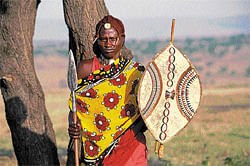

A recent article in the journal Science identifies the obscure “click” languages of southern Africa as the ones that spawned the world’s 6,000 others. What gives away their grandfather status is that they have more sounds than any other languages on earth. Most noteworthy are the telltale tongue-clicks, which in these languages are normal, not peculiar. It’s languages like English that are not only odd but, in their way, broken.
It’s certainly natural to sense instead that if languages were ice cream, English would be vanilla, while click languages would be onion daiquiri. The clicks are bizarre to anyone who doesn’t grow up with them. In Namibia’s Nama language, hara means “swallow,” but !hara, with one of many clicks before it, means “check out,” while ?hara means “repulse.”
The clicks can be awesomely prolific as well. Another click language, !Xoo — whose name alone sounds like a hiccup meeting a sneeze in French — has over a 100 different click sounds, and while English has only 44 sounds overall, !Xoo has about 150.
One might wonder why, when in fact a better question would be why English has so few. The normal state of language is a complexity that can seem almost unreal. In Hmong a mere syllable can have seven different meanings — “round,” “thorn,” “pancreas,” “female,” “throw,” “see,” “paternal grandmother” — according to which pitch you use. Not only sound but grammar gets knottier in small languages, too. We find German’s three genders hard enough, but the Nasioi of Papua New Guinea manage about a 100.
This kind of thing happens over time as languages amass new sounds and shades of meaning, which infants can nevertheless learn effortlessly. The past tense suffix -ed in English, for example, started as an ancient Germanic word for “did” that gradually glommed on to verbs’ tail end: walk-did became walked. With that kind of transformation happening in a thousand ways over thousands of years, the results of things like gendered nouns, irregular verbs, and musical tone making the difference between your pancreas and your father’s mom. The result is like a group of friends’ collection of inside jokes, pregnant with subtleties and shared history, and largely opaque to an outsider.
Just as an outsider who tries to participate in one of those inside jokes often screws up, adults have a hard time learning a new language completely. In fact, if a language submits to too many adults bungling it the way most of us did to languages we tackled in school, then it gets simpler. It’s what made the difference between !Xoo or Nasioi and good old English, when Vikings overran Britain starting in the eighth century. Old English had three genders, like German does; distinguished between things like there and yonder (i.e. way over there); and had a word wit that meant “we two” as distinct from “we three or more.”
But so many children heard Vikings’ close-but-not-quite version of Old English that there arose a new streamlined English, which I am now writing in, in which we consider our dozen or so irregular plurals like men and people as cute wrinkles. Meanwhile, in a language like Kenya’s Luo, all plurals are irregular. It’s the languages that have been learned as much by adults as by children — languages such as Persian, Indonesian, Mandarin Chinese — that are strangely user-friendly.
The result is a paradox: The cultures with the least contact with modern civilisation have the most elaborate languages, while the languages of societies with tall buildings, iPhones, and psychoanalysis tend to be among the world’s most elementary. As such, the finding that these obscure African languages were the world’s first is instructive beyond the mere issue of primacy.
The first humans who spoke these first languages were of a particular societal type: indigenous hunter-gatherers like most click-language speakers today. Yet their languages were more complex than distant-descendant languages like English, spoken by post-Stone Age urbanites. The sophistication of tiny, unwritten languages reminds us not only that their speakers are the equal of First Worlders in mental capacity, but that we moderns express the intellectual in languages that are romper-room compared to any tribal language.
In this, we can truly understand that language and thought hardly walk in lockstep. Nuance and complexity are tools common to all humans, regardless of the form of the language they speak.